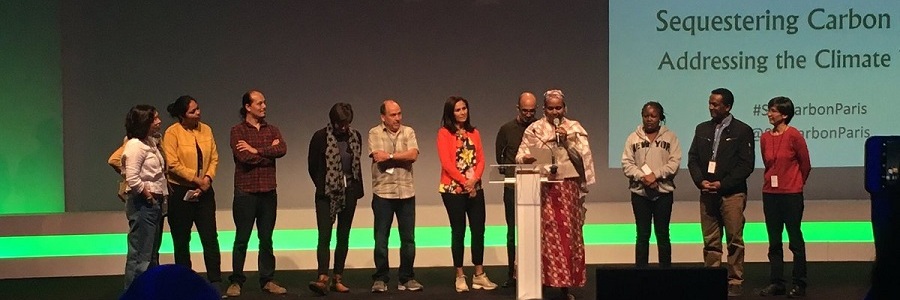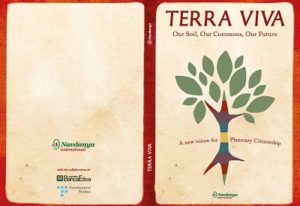
Navdanya joined the 2nd International Dialogue on The Future of Food in a Climate Changing World and the Sequestering Carbon in Soil, in Paris in the first week of May 2017.
The Global Alliance for the Future of Food meeting was focused on gaining deeper insights into the connections between climate change and food systems, to craft visions of the food systems we need today and tomorrow, and to chart potential pathways to get there.
The Soil Carbon Conference aim was to explore the state of our scientific understanding, results from field trials, emerging policy frameworks, and proposals to accelerate progress and build the field of soil based carbon sequestration globally.
Navdanya, along with other participants, at the Sequestering Carbon in Soil Conference, presented a statement that expressed their concern about the narrow focus on carbon sequestration as a primary tool for mitigating climate change, as well as about equity impacts, increased dispossession of peasant farmers of their land and further corporatization of nature. (See below).
The participants pointed out that the climate crises must be framed in a much more holistic way in terms of food systems that are ecologically sustainable and regenerative, like agroecology, which both builds soil health and sequesters carbon. The goal cannot be only sequestering carbon, but the overall heath of ecosystems and people, the generation of livelihoods and healthy economies, the creation of equity and justice.
According to the Climate, Land, Ambition and Rights Alliance (CLARA) report: “Climate Action in the Land Sector: Treading carefully“, the new Sustainable Development Mechanism, CORSIA and other carbon trading schemes “should not expand or introduce land use activities“, as the big push for more investments in land and to offset ever increasing fossil fuel emissions – by “avoiding“ emissions in the land and forest sector – as these could lead to further land grabs and human rights violations, more corporate control and a deepening of our dependence on industrial agriculture. This is moving us further away from where we need to go and offers little benefit for smallholder farmers and pastoralists around the world. It is also a big equity issue since large areas of agricultural land that could be targeted for soil carbon sequestration measures are in the Global South.
In the core message of the manifesto Terra Viva and in the Citizen’s Pact to protect the Planet and Each Other, Navdanya makes clear how seed and food sovereignty are intrinsically linked with climate change, and to our soils, our health and social justice.
It is a path based on global citizenship and the sharing of resources, a path which aims for a circular economy based on regeneration of resources, where agriculture plays a key role.
The industrial model of agriculture, based on monocultures, extensive use of chemicals and genetically modified seeds, together with the economic model of free trade neoliberal policies and deregulation of commerce, is damaging our health and destroying our ecosystems, our soils, water and biodiversity and is a major contributor to climate change.
The industrial model is poisoning the Earth and millions of people, pushing small farmers off the land, allowing corporations to establish monopolies and take control of our seed and food – while producing only a small fraction of the planet’s food. The future of our food lies in the hands of small farmers, producers of the majority of the planet’s food, poison-free, biodiverse and nourishing food. It is this ecological model of agriculture which offers the solution to poverty, hunger and malnutrition in the world and to the crisis of climate change.
While regenerating the soil and sequestering carbon, ecological small-scale agricultural practices produce more food on less land and are rooted in biodiversity. There is much evidence which proves folk crop varieties can withstand a wide range of climatic and soil conditions, whereas “modern” crop varieties tend to perish with small environmental variations, such as early or late rains. Crop landraces grown by traditional farmers continue to evolve genetically in response to human management and environmental changes. A large array of genes responsible for resistance to different pests, pathogens and environmental conditions are found in folk crop cultivars and their wild relatives. Navdanya’s experience of working with farmers for over 30 years shows that biodiversity based organic farming not only provides more nutrition and health per acre but also creates resilience against the changing climate and mitigates climate change.
- A recent study done by Navdanya in Odisha, Bundelkhand, Uttarakhand and Maharashtra confirms that open pollinated indigenous seeds are better alternatives to the hybrid, high yielding or GM seeds. Hundreds of farmers in Odisha those who recived indigenous seeds by Navdanya after the Phailin super cyclone, produced very good yields.
- Working with farmers across the country and Bhutan, Navdanya has found that, by adopting the principles of agroecology and biodiversity-based organic farming, farmers can not only increase their yields by 2 to 3 times but at the same time can reduce their input costs. Indigenous open pollinated varieties are not only capable of producing more, but are also resilient to the climate. Comparative studies of 22 rice-growing systems have shown that indigenous systems are more efficient in terms of yields, and in terms of labour use and energy use (Shiva & Pandey 2006).
–
Research world over has already proven the importance of indigenous crops and organic farming practices in coping with the changing climatic conditions. This underlines the key role of policies and regulations related to access to Seed and to the protection of biodiversity and indigenous knowledge in times of climate havoc and cannot be excluded from the equation.
Statement from Participants
Presented at Sequestering Carbon in Soil: Addressing the Climate Threat Conference
Les Fontaines, Chantilly France
5 May 2017
We, a group of conference participants who believe in the urgency of addressing the threats of climate change through holistic perspectives and systems thinking, recognize the powerful potential of putting carbon in the soil for mitigating GHG emissions. However, we wish to call your attention to the risks of centering the conference on soil carbon sequestration as the main response strategy. We have heard that many other participants and the organisers of this event share our concerns. We hope to contribute to a successful outcome of this conference by making the following statement to clarify our perspective and propose a way forward.
As we already know, analysing, understanding and dealing with complex social and ecological impacts of climate change on food and farming systems requires a holistic approach. We are deeply concerned that a narrow focus on carbon, however, may lead to unintended negative consequences, such as further fostering a profit-driven economy around the commodification of soil, incentivizing industrial agriculture through carbon markets, promoting land grabbing, increasing corporate control over land and other resources, and repeating failed schemes like REDD+ schemes and carbon markets, which have benefitted carbon traders and large scale agricultural operations at the expense of our communities.
Given the urgency of tackling global climate change, we propose to reframe the emphasis of the conference around the much-needed transformation of conventional food and farming systems and their root causes through the holistic approach of agroecology. This transformation centers the improvement of small-holders’ and Indigenous communities´ livelihoods as a key strategy to achieve food sovereignty, equity and resilience. This approach will in turn lead to healthy soils rich in organic matter and carbon as an added benefit and ultimately contribute to the adaptation to and mitigation of climate change, a goal we all share.
We believe that this new emphasis not only echoes the concerns of many participants here, but would also elicit a more inclusive, productive and enduring global network for addressing climate change by strengthening resilient rural communities with secure access to soils, water, biodiversity and other resources. We invite our fellow conference participants to join us in reframing our conversations today and going forward, utilizing this more holistic approach to build a truly broad movement for change.
Thank you for listening to us this morning and for this opportunity to share our views and our proposal.
Presented by Shoba Liban, Pastoralist Women for Health and Education, Kenya
Signed* by:
Camilla Ables, National Academies of Sciences, Engineering, and Medicine, USA
Miguel A. Altieri, Sociedad Científica Latinoamericana de Agroecología-California
Million Belay, Alliance for Food Sovereignty in Africa, Ethiopia
Javier Carrera, Red de Guardianes de Semillas, Ecuador
Jimena Esquivel-Sheik, CATIE-Costa RicaLili Fuhr, Heinrich-Böll-Stiftung, Germany
Marcia Ishii-Eiteman, Pesticide Action Network North America, USA
Edna Kaptoyo, International Indigenous Women’s Forum (FIMI), Kenya
Shoba Liban, Pastoralist Women for Health and Education, Kenya
Clara Nicholls, Sociedad Científica Latinoamericana de Agroecología (SOCLA), Colombia
Julio C. Postigo, NORC at the University of Chicago
Elsa Sanchez, Catholic Relief Service – Central America
Lea Astrude T. Santiago, organic farmer, Philippines
Ruchi Shroff, Navdanya International, Italy
Javier Silva, Universidad Nacional Agraria, Nicaragua
Danilo Solano Rojas, Asociación de Agricultores para la Captura de Carbono, Costa Rica
Lemma Kebede Wassie, Center for Indigenous Questions, Ethiopia
*Institutional affiliation provided for identification purposes only
Also read:
Which Future of Food and Farming
Reflections on World Food Day 16th October 2015
By Dr Vandana Shiva

